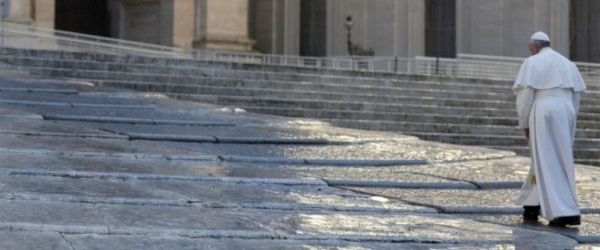Faith is neither an alienation nor a scam, but is a concrete path of beauty and truth, traced out by Jesus, to prepare our eyes to gaze without spectacles upon "the marvellous face of God" in the definitive place that is prepared for each one. It is an invitation not to be taken in by fear and to live life as a preparation to see better, listen better and love more [...].
Pope Francis focused his homily on the Gospel passage from St John (14:1-6): "Let not your heart be troubled. Have faith in God and have faith also in me. In my Father's house there are many mansions. If not, would I ever have said to you, "I will go and prepare a place for you"? When I have gone and prepared a place for you, I will come again and take you with me, that where I am you may be also. And of the place where I go, you know the way'.
"These words of Jesus," the Pontiff commented, "are really beautiful words. In a moment of farewell, Jesus speaks to his disciples right from the heart. He knows that his disciples are sad, because they realise that it is not going well". Here, then, that Jesus encourages them, reassures them, offers them a horizon of hope: "Let not your heart be troubled! And he begins to speak like this, like a friend, even with the attitude of a shepherd. I say: the music of these words of Jesus is the attitude of the shepherd, as the shepherd does with his sheep. "Let not your heart be troubled. Have faith in God and have faith also in me'".
Saying these words, according to the Gospel narrative of St John, Jesus - said the Pope - "begins to speak: of what? Of heaven, of the ultimate homeland. 'Have faith also in me: I remain faithful' is as if he were saying this". And using the metaphor, "the figure of the engineer, of the architect tells them what he is going to do: 'I am going to prepare a place for you, in my Father's house there are many mansions'. And Jesus goes to prepare a place for us'.
"How is it," Pope Francis wondered, "this preparation? How does it happen? What is that place like? What does it mean to prepare a place? To rent a room up there?". Preparing the place means "preparing our possibility to enjoy, our possibility to see, to feel, to understand the beauty of what awaits us, of that homeland towards which we are walking".
"And the whole Christian life," the Pontiff continued, "is a work of Jesus, of the Holy Spirit to prepare a place for us, to prepare our eyes to be able to see. "But, Father, I see well! I don't need glasses!". But that is another vision. Think of those who are cataract sufferers and have to have cataract surgery: they see, but what do they say after the operation? "Never did I think that we could see like this, without glasses, so well!" Our eyes, the eyes of our soul need, need to be prepared to look at that wonderful face of Jesus". It is a matter, then, of 'preparing the hearing to be able to hear beautiful things, beautiful words. And mainly prepare the heart: prepare the heart to love, to love more'.
'In the journey of life,' the Pontiff explained, 'the Lord always does this: with trials, with consolations, with tribulations, with good things. The whole journey of life is a journey of preparation. Sometimes the Lord has to do it quickly, as he did with the good thief: he only had a few minutes to prepare him and he did it. But the normality of life is to go like this: let us prepare the heart, the eyes, the hearing to arrive at this homeland. Because that is our homeland".
Pope Francis warned against losing sight of this fundamental dimension of our life and the journey of faith, and of the objections of those who do not recognise a perspective of eternity: '"But, Father, I went to a philosopher and he told me that all these thoughts are an alienation, that we are alienated, that life is this, the concrete, and beyond that we do not know what it is...". Some people think so. But Jesus tells us that this is not the case and says: 'Have faith also in me. What I say to you is the truth: I do not cheat you, I do not deceive you'. We are on our way to the homeland, we children of Abraham's seed, as St Paul says in the first reading' (Acts of the Apostles 13: 26-33).
"And since the time of Abraham," said the Pope, "we have been on a journey, with that promise of the definitive homeland. If we go and read chapter eleven of the letter to the Hebrews we will find that beautiful figure of our ancestors, our fathers, who made this journey to the homeland and greeted it from afar. To prepare for heaven is to begin to greet it from afar". And "this is not alienation: this is truth, this is letting Jesus prepare our heart, our eyes for that great beauty. It is the path of beauty. It is also the path of the return to the homeland'.The Pope concluded his homily by hoping "that the Lord will give us this strong hope" and "also give us the courage to greet the homeland from afar". And finally, "give us the humility to allow ourselves to be prepared, that is, to let the Lord prepare the dwelling, the definitive dwelling, in our heart, in our eyes and in our hearing".
[Pope Francis, S. Marta homily in L'Osservatore Romano 26 April 2013] [cf. https://www.vatican.va/content/francesco/en/cotidie/2013/documents/papa-francesco-cotidie_20130425_magnanimity-humility.html]












